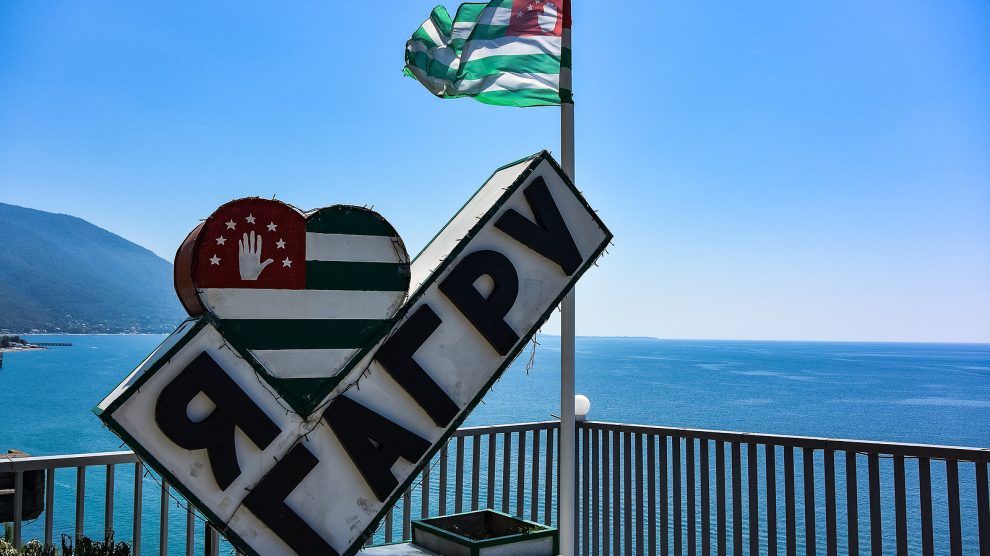Few people outside of Russia take former president and PM Dmitry Medvedev seriously, but his recent comments suggesting Moscow might annex parts of Georgia would have made the Kremlin-friendly government in Tbilisi pause for thought.
As Georgians sombrely marked the 15th anniversary of a 2008 war with Russia over the two breakaway states of Abkhazia and South Ossetia, a former Russian president and prime minister, Dmitry Medvedev, these days the Kremlin’s security council deputy chair, was writing an article for the Russian weekly Argumenty I Fakty suggesting Moscow annex the two regions.
“In Abkhazia and South Ossetia, the idea of joining Russia is still popular,” wrote Medvedev. “And it may well be implemented if there are good reasons for it.”
- What lies behind Georgia’s ‘strategic partnership’ with China?
- It’s not just Ukraine. Russia occupies territory in other countries in emerging Europe
- The history, culture, and food of Georgia: Five essential reads
Abkhazia and South Ossetia are internationally recognised as part of Georgia, but they host Russian troops and are recognised as independent countries by Russia and a handful of its allies. Medvedev’s comments have been resoundingly rejected by political leaders in Tbilisi but also in the Abkhaz capital of Sokhumi.
Sabre-rattling
Medvedev served as the president of Russia from 2008—he was in office during the Georgian war—to 2012 and then as the country’s prime minister until 2020. In the rambling article, he accused NATO of escalating tensions in the south Caucasus by discussing membership for Georgia and compared “anti-Russian hysteria” and “freaks” in Georgia to Ukraine.
Referencing the anti-Russian sentiment held by many Georgians, Medvedev wrote, “Russophobia is a nonsense, a deformity, a serious disease, but which is, luckily, curable,” seemingly threatening military force.
Medvedev, who for a while posed as a reforming liberal, has frequently taken hawkish public stances on Russian foreign policy since Moscow’s invasion of Ukraine.
“Medvedev’s comments are counterproductive for Russia, to the point that I can’t understand what purpose do they serve,” Dr Bidzina Lebanidze of the Georgian Institute of Politics tells Emerging Europe. “They were rejected by both Tbilisi and Sokhumi—South Ossetia does not have any real independent agency to reject or accept anything.”
While Abkhazia is home to around 244,000 people, South Ossetia is home to fewer than 57,000—most of whom live in its capital of Tskhinvali. Georgians refer to South Ossetia as the Tskhinvali Region.
“Everyone knows Medvedev does not hold any real power, so the question is whether this was his own idea or is he airing the Kremlin’s message box,” Dr Lebanidze adds.
Medvedev’s article was written in Russian in a Moscow newspaper and is filled with insults targeting Ukrainian leaders, so its purpose could have been as much domestic propaganda as a statement of official policy.

A self-inflicted wound
Even if the article was intended primarily for a Russian audience, it could end up harming or even alienating some of the only politicians in Europe still interested in warm relations with Moscow.
Since Russia’s invasion of Ukraine, Georgia has pursued a somewhat bipolar foreign policy, with President Salome Zourabichvili staunchly advocating for closer ties with the West even as prime minister Irakli Garibashvili’s Georgian Dream party has deepened relations with Russia and established a “strategic partnership” with China.
While Tbilisi still claims Abkhazia and South Ossetia as its own—a territorial dispute that could complicate its eventual NATO accession—the Georgian Dream government has pursued a less aggressive policy towards the two territories than its predecessor, the United National Movement of Mikheil Saakashvili.
While Russian troops in South Ossetia have periodically shifted the de facto boundaries of the region in a process called “borderisation”, there have been no major skirmishes since 2008.
Dr Lebanidze says Medvedev’s article “does a lot of harm to Georgian Dream’s attempts to cozy up to Russia, and the opposition will be happy to capitalise on this. Perhaps in Russia not everyone understands that Georgian Dream is the most ‘Russia-friendly’ government Russia can ever get in Georgia, even if they did not entirely abandon the pro-Western course, but that’s understandable considering Russia-sceptic attitudes among the majority of Georgians.”
Georgians overwhelmingly support joining NATO and the European Union, and Tbilisi applied for EU membership in early 2022 along with Moldova and Ukraine. However, while the EU extended candidate status to both Ukraine and Moldova, it returned Georgia a list of reforms on which it must act in order to be granted candidate status.
The Georgian Dream government has since supported legislation opposed to these principles, leading many in the country to suggest that it is deliberately sabotaging Georgia’s chances of candidate status—potentially to placate Russia.
“It makes no sense, why Russia would try to delegitimise Georgian Dream’s Russia-accommodating policy,” said Dr Lebanidze.
Many Georgians support Georgian Dream’s domestic policies (or simply cannot stand the opposition). Medvedev’s suggestion of annexation will only further test support for a government increasingly close to the country whose troops occupy 20 per cent of its land.
Unlike many news and information platforms, Emerging Europe is free to read, and always will be. There is no paywall here. We are independent, not affiliated with nor representing any political party or business organisation. We want the very best for emerging Europe, nothing more, nothing less. Your support will help us continue to spread the word about this amazing region.
You can contribute here. Thank you.


